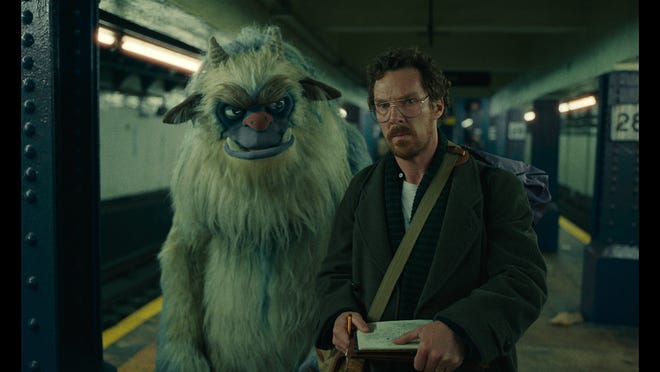SPOILER ALERT! The following story contains major plot details about the series finale of “Eric” (now streaming on Netflix).
Benedict Cumberbatch is a monster of a man.
In the Netflix series Eric, the two-time Oscar nominee plays Vincent Anderson, a violent alcoholic who helps run Good Day Sunshine, a Sesame Street-esque children’s TV show set in 1980s New York. At home, Vincent is a terror to his wife, Cathy (Gaby Hoffmann), and their nine-year-old son, Edgar (Ivan Howe), who goes missing one day on his way to school. This sends Vincent spiraling downward, leading him to go on a drug-addled quest into New York’s underworld, accompanied by a hallucinatory giant doll named Eric.
Edgar’s disappearance is thought to be a kidnapping, but it turns out he has actually run away, and in the sixth and final episode of the series, Vincent dresses up in Eric’s costume and makes a television appeal for his son to come home, resulting in a tearful reunion.
But it ends decidedly unhappy for Michael (McKinley Belcher III), a black gay cop who is forced to keep his sexual orientation secret as the AIDS panic hits the city, while the search for missing black teen Marlon Rochelle comes to a heartbreaking end.
Want to take a break? Play the USA TODAY Daily Crossword Puzzle.
“It’s about[Vincent and Michael’s]parallel journeys of finding themselves,” said creator Abi Morgan (The Iron Lady), discussing the series finale with USA Today.
Is Eric based on a true story?

While true-crime docuseries have become hugely popular on Netflix, “Eric” isn’t one of those series. “It’s not based on a specific story,” Morgan says. “I think if I wanted to do that, I would have delved deeper into that story.” Rather, the show is loosely based on some cases she heard about while growing up in the UK. “There were a few kids who went missing, and I wanted to make a kind of everyday kid. The simple act of going out one day and not coming back really resonated with me.”
How will the show end for Benedict Cumberbatch’s character?

The series ends with Vincent on the set of “Good Day Sunshine.” Edgar walks up dressed in an Eric costume and introduces himself as the Monster. “It’s a pleasure to meet you,” Vincent says. “Have we met before?” The camera pans up to the “real” Eric watching father and son from afar, before the end credits roll.
“I wanted to go back to this idea of the boy reclaiming his monster. I always had this really strong image of the boy crawling back inside,” Morgan says of the final scene. “In its simplest metaphor, it’s about the inner child. Vincent goes on a journey to find his son and eventually realizes it’s a journey to find himself.” Ultimately, “it’s about this boy understanding his father in a way that even Vincent doesn’t understand. And in going on this journey, he realizes a great lesson that Edgar has shown him: Don’t neglect your children just because they’re listening and observing.”
What is the final song of the series?
The series ends with “I’m Not in Love,” a bittersweet 1975 ballad by British group 10cc, a callback to the first episode, in which Edgar hears the song on his walk to school on the day he goes missing. “There’s a haunting romanticism to it,” Morgan says. “We hear it when Edgar goes missing, and when he comes back it’s played at a much gentler level so you can enjoy it as a song. We resign ourselves to a reassuring resolution, with father and son together at the end.”
What will happen to Marlon Rochelle and his mom?

Michael learns from security camera footage that Marlon was sexually abused by a closeted gay politician and murdered by a racist police detective behind a nightclub. His body is taken to a landfill by a garbage collector, and in a harrowing scene, his mother, Cecil (Adepero Oduye), searches the dump looking for her son. “He deserved to live in a city that would protect him,” Cecil says at a press conference after the murder. “Please, for all your sons, do more.”
In writing Marlon’s story, Morgan was inspired by the 1993 murder of Stephen Lawrence, a black British teenager, and the more recent police killing of George Floyd, and she wanted to show audiences that there are no “neat solutions” when it comes to justice.

Cecil is not only a mother who has lost a child, but also represents “a lost generation of mothers,” Morgan says. “Her iconic final lines are a nod to Arthur Miller’s ‘My Sons’ about taking responsibility. Cecil is calling for collective responsibility for how we raise and support our sons – through family, police, government, etc.”
Will there be a season 2 of Eric?

“Eric” is a miniseries that brings closure to most of the main characters. But if the show is a hit, could a second season focus on another missing persons case or corner of New York? Morgan says he finds the possibility “interesting,” but that it was never his intention.
“The fun of a limited series is that you want it to shine for that period of time, so we didn’t go any further than that,” Morgan said. “The characters exorcised their demons and found closure, and I think we addressed everything there was to it as an exploration of the city at the time. I feel like we hit the ground running after six episodes, so I don’t know if we’ll go any further than that.”

